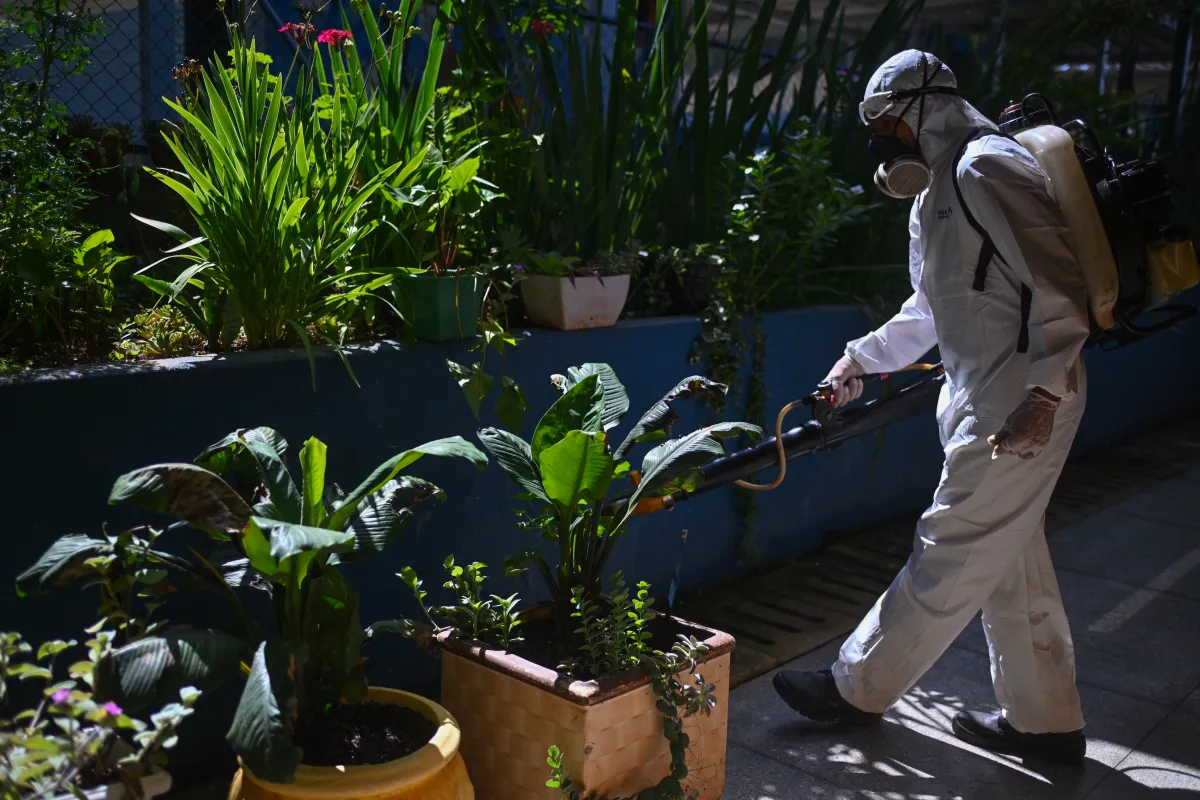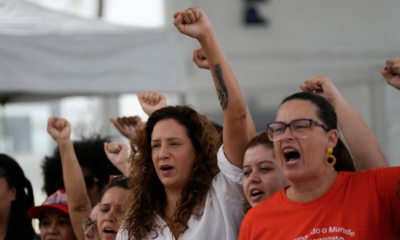International
Dengue epidemic in Latin America reaches alarming figures in the first quarter of 2024

The dengue epidemic in South America has reached alarming figures so far in 2024, with a notable increase in cases and deaths compared to the previous year, especially in Brazil, a country that has surpassed its own annual historical record of dengue infections, to date more than two million cases and 715 deaths.
The situation is especially worrying in Brasilia, with 5,774 cases per 100,000 inhabitants.
Authorities estimate that the number could amount to 4.2 million by the end of the year and have begun to offer vaccination despite the shortage of doses.
In Argentina, the Ministry of Health reported 151,310 cases of dengue, 134,202 of them registered this year, with an incidence of 321 cases per 100,000 inhabitants and 106 deaths, 96 of which occurred in 2024.
In addition, nineteen of the 24 territorial divisions have reported the presence of the virus, removing only Patagonian regions due to unfavorable weather conditions for mosquitoes.
The Government of Javier Milei has opted for strategies that do not include mass vaccination, saying that there is a lack of evidence about the effectiveness of vaccines in current outbreaks.
For its part, Uruguay reached 158 cases of dengue on Monday (62 native and 96 imported) after adding 10 new cases in the last 24 hours, the Ministry of Public Health said in its daily report, in which it indicated that the majority of imports are from people who traveled to Argentina and Brazil.
On the other hand, Paraguay also reports worrying figures.
Since September 2023, the beginning of the most recent outbreak, until the second week of March 2024, the country has suffered 74 deaths due to dengue, the Ministry of Public Health and Social Welfare reported.
Data from the General Directorate of Health Surveillance indicate that 35% of the deceased were over 60 years of age.
Peru is also experiencing an increase with 79,741 cases reported so far in 2024, an increase of 262% compared to the same period of the previous year.
82 deaths have been reported, a considerable jump from the 29th of the corresponding period in 2023.
The incidence of the disease is 233.77 per 100,000 inhabitants, with La Libertad being the most affected region.
In Colombia, the National Institute of Health has registered 55,340 cases, with 40.2% showing signs of alarm and 1% of serious cases. As of March 3, 94 probable deaths have been reported, with 10 confirmed cases and 69 under study.
The incidence of dengue at the end of February 2024 was 154.8 cases per 100,000 inhabitants at risk, in stark contrast to the 48.8 cases per 100,000 inhabitants reported in the same period of the previous year.
As so last in 2023, the Pan American Health Organization (PAHO) warned of the increase in dengue cases in the Americas. Last year the figure was 4.5 million cases.
Dengue, whose main vector of transmission in almost the entire American continent is the Aedes aegypti mosquito, affects people of all ages, and according to the World Health Organization, behind the expansion of the epidemic is the climate phenomenon of El Niño, as evidenced by the fact that it is growing in all parts of the world, except in Europe, according to the director general of the WHO, Tedros Adhanom.
The increase in dengue cases in Latin America, according to experts, is also due to the need for more effective preventive and control actions, as well as constant epidemiological surveillance to combat the progression of the disease.
International
U.S. Senate Rejects Budget, Bringing Government Closer to Shutdown Amid DHS Dispute

The U.S. Senate voted on Thursday against a budget proposal in a move aimed at pressuring changes at the Department of Homeland Security (DHS), following the killing of two civilians during a deployment of immigration agents in Minneapolis.
All Senate Democrats and seven Republican lawmakers voted against the bill, which requires 60 votes to advance, pushing the country closer to a partial government shutdown that would cut funding for several agencies, including the Pentagon and the Department of Health.
The rejection came as Senate leaders and the White House continue negotiations on a separate funding package for DHS that would allow reforms to the agency. Proposed measures include banning Immigration and Customs Enforcement (ICE) agents from wearing face coverings and requiring them to use body-worn cameras during operations.
The vote took place just hours after President Donald Trump said he was “close” to reaching an agreement with Democrats and did not believe the federal government would face another shutdown, following last year’s record stoppage.
“I don’t think the Democrats want a shutdown either, so we’ll work in a bipartisan way to avoid it. Hopefully, there will be no government shutdown. We’re working on that right now,” Trump said during a Cabinet meeting at the White House.
International
Trump Says Putin Agreed to One-Week Halt in Attacks on Ukraine Amid Extreme Cold

U.S. President Donald Trump said on Thursday that he secured a commitment from Russian President Vladimir Putinto halt attacks against Ukraine for one week, citing extreme weather conditions affecting the region.
“Because of the extreme cold (…) I personally asked Putin not to attack Kyiv or other cities and towns for a week. And he agreed. He was very pleasant,” Trump said during a Cabinet meeting broadcast by the White House.
Trump acknowledged that several advisers had questioned the decision to make the call.
“A lot of people told me not to waste the call because they wouldn’t agree. And he accepted. And we’re very happy they did, because they don’t need missiles hitting their towns and cities,” the president said.
According to Trump, Ukrainian authorities reacted with surprise to the announcement but welcomed the possibility of a temporary ceasefire.
“It’s extraordinarily cold, record cold (…) They say they’ve never experienced cold like this,” he added.
Ukrainian President Volodymyr Zelensky later commented on the announcement, expressing hope that the agreement would be honored.
International
Storm Kristin Kills Five in Portugal, Leaves Nearly 500,000 Without Power

Storm Kristin, which battered Portugal with heavy rain and strong winds early Wednesday, has left at least five people dead, while nearly half a million residents remained without electricity as of Thursday, according to updated figures from authorities.
The revised death toll was confirmed to AFP by a spokesperson for the National Emergency and Civil Protection Authority (ANPEC). On Wednesday, the agency had reported four fatalities.
Meanwhile, E-Redes, the country’s electricity distribution network operator, said that around 450,000 customers were still without power, particularly in central Portugal.
Emergency services responded to approximately 1,500 incidents between midnight and 8:00 a.m. local time on Wednesday, as the storm caused widespread disruptions.
The Portuguese government described Kristin as an “extreme weather event” that inflicted significant damage across several regions of the country. At the height of the storm, as many as 850,000 households and institutions lost electricity during the early hours of Wednesday.
Several municipalities ordered the closure of schools, many of which remained shut on Thursday due to ongoing adverse conditions.
Ricardo Costa, regional deputy commander of the Leiria Fire Brigade, said residents continue to seek assistance as rainfall persists.
“Even though the rain is not extremely intense, it is causing extensive damage to homes,” he noted.
In Figueira da Foz, a coastal city in central Portugal, strong winds toppled a giant Ferris wheel, underscoring the severity of the storm.
-

 Central America4 days ago
Central America4 days agoGuatemala seizes over a ton of cocaine hidden in flour at Pacific port
-

 Central America3 days ago
Central America3 days agoGuatemala Police Arrest Prison Guard Caught in the Act of Extortion
-

 Central America3 days ago
Central America3 days agoHonduras swears in conservative president Asfura after disputed election
-

 International4 days ago
International4 days agoHistoric snowstorm paralyzes Toronto after 60 centimeters of snow
-

 Central America3 days ago
Central America3 days agoBukele leads public trust rankings as UCA survey highlights gains in security
-

 International2 days ago
International2 days agoFootball Fan Killed in Clashes After Colombian League Match
-

 International4 days ago
International4 days agoSpain’s irregular migrant population rises to 840,000, study finds
-

 Central America2 days ago
Central America2 days agoGuatemala President Says Starlink Terminal Found Inside Prison
-

 International3 days ago
International3 days agoDoomsday clock moves to 85 seconds before midnight amid rising global risks
-

 International3 days ago
International3 days agoWinter Storm Fern Leaves 30 Dead and Over One Million Without Power Across the U.S.
-

 Sin categoría3 days ago
Sin categoría3 days agoEight Killed in Series of Armed Attacks in Ecuador’s Manabí Province
-

 International3 days ago
International3 days agoSpain approves plan to regularize up to 500,000 migrants in Historic Shift
-

 International1 day ago
International1 day agoU.S. Senate Rejects Budget, Bringing Government Closer to Shutdown Amid DHS Dispute
-

 International4 days ago
International4 days agoRights group says nearly 6,000 killed in Iran protest crackdown
-

 Sin categoría3 days ago
Sin categoría3 days agoEl Salvador Launches Fourth Year of Ocean Mission to Protect Marine Ecosystems
-

 International2 days ago
International2 days agoMissing Spanish Sailor Rescued After 11 Days Adrift in Mediterranean
-

 International2 days ago
International2 days agoRubio Says U.S. Could Participate in Follow-Up Russia-Ukraine Talks
-

 Central America7 hours ago
Central America7 hours agoPanama Supreme Court Strikes Down Panama Ports Concession as Unconstitutional
-

 International4 days ago
International4 days agoVenezuela frees at least 80 political prisoners, NGO says
-

 International4 days ago
International4 days agoEU launches new probe into X over AI-generated fake nude images
-

 International1 day ago
International1 day agoStorm Kristin Kills Five in Portugal, Leaves Nearly 500,000 Without Power
-

 International1 day ago
International1 day agoTrump Says Putin Agreed to One-Week Halt in Attacks on Ukraine Amid Extreme Cold
-

 Central America7 hours ago
Central America7 hours agoU.S. and Guatemala Sign Trade Deal Granting Zero Tariffs to Most Exports
-

 International4 days ago
International4 days agoFrance debates ban on social media for children under 15
-

 International1 day ago
International1 day agoMan Arrested After Vehicle Crashes Into Jewish Institution in Brooklyn
-

 International4 days ago
International4 days agoSevere winter storm grips U.S., leaves multiple dead as extreme cold persists




























